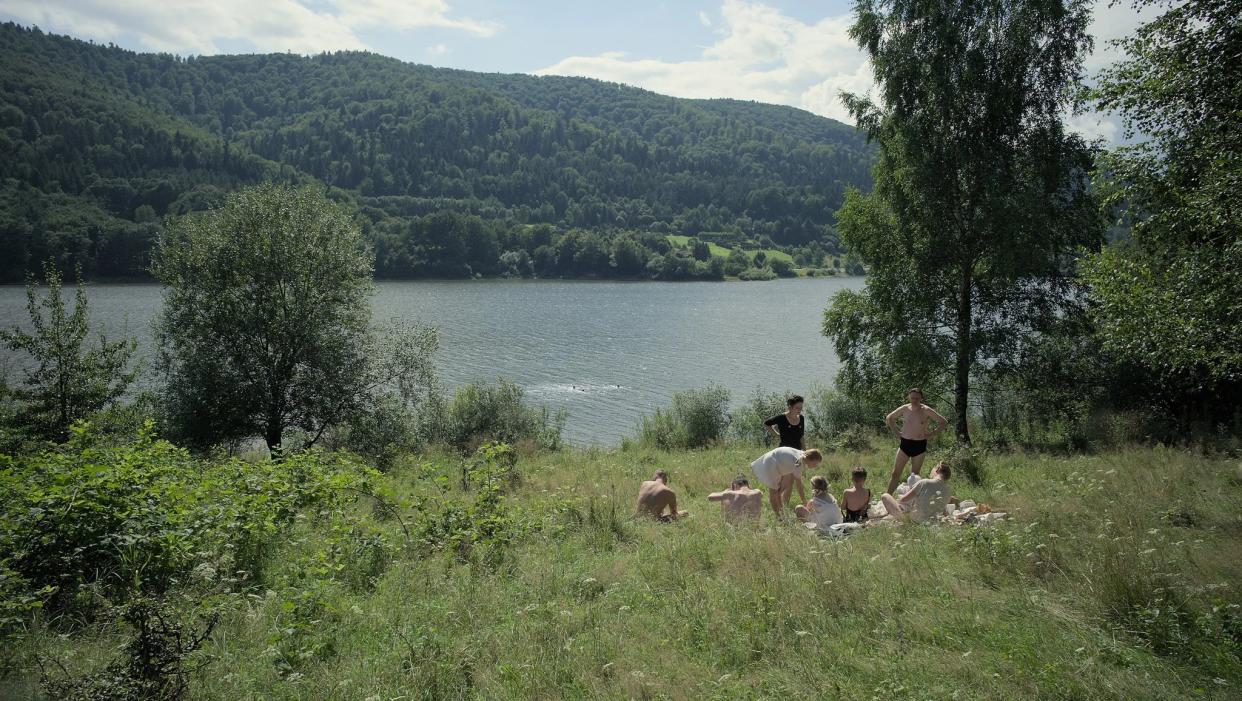‘The Zone of Interest’ Review: Jonathan Glazer’s Holocaust Anti-Drama Is a Chilling Look at the Banality of Evil

- Oops!Something went wrong.Please try again later.
- Oops!Something went wrong.Please try again later.

Editor’s note: This review was originally published at the 2023 Cannes Film Festival. A24 releases the film in select theaters on Friday, December 15.
Holocaust cinema has so implicitly existed in the shadow of a single question that it would no longer seem worth asking if not for the fact that it’s never been answered: How do you depict an atrocity? The most urgent and indelible examples of the form offer equally simple yet perfectly contradictory responses. Documentaries like “Shoah” and Alain Resnais’ “Night and Fog” suggest that you don’t, while historical epics like “Schindler’s List” insist that you must. If the latter argues that seeing is believing, the former maintains that seeing wouldn’t help — that some things are too unfathomable for the human eye to comprehend from a distance, and can only hope to be understood by their absence. A tsunami might not seem much bigger than any other wave if you stare at it from a distant shore, but watching the ocean water as it gets sucked back into the sea reveals the full immensity of what’s coming.
More from IndieWire
A narrative Holocaust drama that’s defined by its rigorous compartmentalization and steadfast refusal to show any hint of explicit violence, Jonathan Glazer’s profoundly chilling “The Zone of Interest” stands out for how formally the film splits the difference between the two opposite modes of its solemn genre — a genre that may now be impossible to consider without it. No Holocaust movie has ever been more committed to illustrating the banality of evil, and that’s because no Holocaust movie has ever been more hell-bent upon ignoring evil altogether. There is a literal concrete wall that separates Glazer’s characters from the horrors next door, and not once does his camera dare to peek over it for a better look. It doesn’t even express the faintest hint of that desire.
“The Zone of Interest” opens with a long overture that forces the audience to sit in pure darkness for several minutes on end as the first pearls of Mica Levi’s elusive score clatter together over the soundtrack. The effect doesn’t create a distance between then and now so much as it elides one; when the first proper scene of the film begins, it feels like an act of unblinking. Our eyes were closed for a time and then opened again, but that’s all — nothing has been filtered through or clarified by the lens of history. The “authorless” quality of Glazer’s images (to borrow the word he uses in the film’s press notes) frees the characters within them from the emptiness of moral judgment. The evil on display is never the least bit in doubt, but its failure to recognize itself as such is only so able to take shape in the absence of its limiting obviousness.
Rudolf Höss (Christian Friedel), his wife Hedwig (“Toni Erdmann” star Sandra Hüller, seen here in an equally fearless performance of a very different stripe), and their five young children enjoy an idyllic picnic on the bank of the river that runs along their house. The sky is blue and the birds are chirping — as Kurt Vonnegut would insist they continue to do, even in the wake of a massacre. When the family retires to their large stucco villa (which is surrounded by a veritable forest of lilacs and ladybirds, and a swimming pool that has its own slide), the kids surprise Rudolf with a canoe for his birthday.
The Aryan fantasy of it all isn’t subtle, but its most ominous details are easy to overlook in a film that refuses to pay them any special attention. It may be a few minutes before you begin to notice the barbed wire that’s coiled atop the far wall of Hedwig’s garden, or the smoke stacks that stick out into the skyline just beyond it. It will be a few minutes longer before an errant line of dialogue confirms that the Höss family lives on the border of history’s most notorious concentration camp, because Rudolf is the commandant of Auschwitz.
To call this a reveal would be overstating Glazer’s emphasis on that information. Rudolf and Hedwig have turned that house into the only true home their family has ever known — a self-contained Eden on the far edge of hell — and by the time the film begins, the muffled shouts and occasional spray of gunfire that carry over the wall are as easy to tune out as the clatter that comes out of any construction site. The house is pressure-sealed away from the camp as if Auschwitz were on the other side of an airplane window: right there but a million miles away. Turbulence is unavoidable, but the powers that be have engineered away the possibility of even the slightest crack. Everything in this film is strictly peripheral.
Much less mindful of plot than the Martin Amis novel from which it’s been (very loosely) adapted, “The Zone of Interest” is a far cry from the kind of story we’ve been conditioned to expect from a premise like this. A desperate Jew never escapes into the Höss family house in order to impress their humanity upon Hedwig or her kids. Nobody has a sudden change of heart, or even experiences anything that might hope to provoke one. When Rudolf is reassigned to an office in Berlin for irrelevant bureaucratic reasons — the closest thing this movie has to a conventional narrative incident — Hedwig throws a shit fit because she doesn’t want to abandon the perfect home she’s built for her precious Nazi children (whose inherited obliviousness might spark your fleeting sympathies). The brief scene where she chews out a maid over a puddle of water on the floor is the movie’s only real flirtation with on-screen violence.
It’s been 10 years since the release of Glazer’s previous feature “Under the Skin,” and “The Zone of Interest” continues that (comparatively hyper-commercial) movie’s forensic obsession with the faultlines of our empathy in a world where it so often falls into the cracks. One is predatory and seductive, the other is placid and ambient. In “Under the Skin,” Scarlett Johansson’s monstrousness is challenged by the gradual emergence of her humanity. In “The Zone of Interest,” Rudolf and Hedwig’s humanity is challenged by the gradual emergence of their monstrousness. In “Under the Skin,” Glazer’s alien protagonist comes to recognize itself in others. In “The Zone of Interest,” his Aryan family explicitly denies themselves that chance.
That being said, the director’s gaze is even more alien here than ever before. In an evolution of the hidden camera tricks he once used to lure real men into Johansson’s van, Glazer shot “The Zone of Interest” with 10 fixed cameras that were placed within the house where roughly 75 percent of the movie takes place, relying on focus-pullers to operate them via remote control. Chronologically overlapping scenes would be shot in different rooms at the same time, from the same distance, and with the same natural or diegetic light — regardless of their dramatic emphasis.
The approach results in a paradoxical effect: The movie feels guided by a human spirit, but absent of a human touch (a disconnect that proves uniquely compelling, and further embarrasses the limitations of AI). The process instills a flattening evenness into a film where the lack of drama becomes deeply sickening unto itself. Watching Rudolf walk the halls of his house or listen to Hedwig talk about spas from their separate beds isn’t so queasy because the camera doesn’t judge them, but rather because it’s literally incapable of doing so. It sees these characters the same way they see themselves, which is to say both clearly and not at all.
Ironically, it’s because of Glazer’s monk-like discipline that “The Zone of Interest” becomes most striking for its few occasional flourishes. In what feels like his version of Spielberg’s girl in the red coat, Glazer uses thermal imaging to watch a local child steal into the night and leave food for the Jews who work the fields of Auschwitz. Later, after a coughing fit that evokes memories of Anwar Congo in “The Act of Killing,” Glazer suddenly introduces an even more dramatic break from the film’s established style — one that returns us to the dialectic between depicting an atrocity and tracing the chalk outline of one.
Do we have to choose, or is it possible that one method can be used to instigate the other? “The Zone of Interest” insists that all of history’s most abominable moments have been permitted by people who didn’t have to see them, and while the film’s ultimate staying power has yet to be determined, its vision of normality is — as Hannah Arendt once described that phenomenon — “more terrifying than all the atrocities put together.”
Grade: A-
“The Zone of Interest” premiered in Competition at the 2023 Cannes Film Festival. A24 will release it in theaters in the U.S.
Best of IndieWire
Sign up for Indiewire's Newsletter. For the latest news, follow us on Facebook, Twitter, and Instagram.

